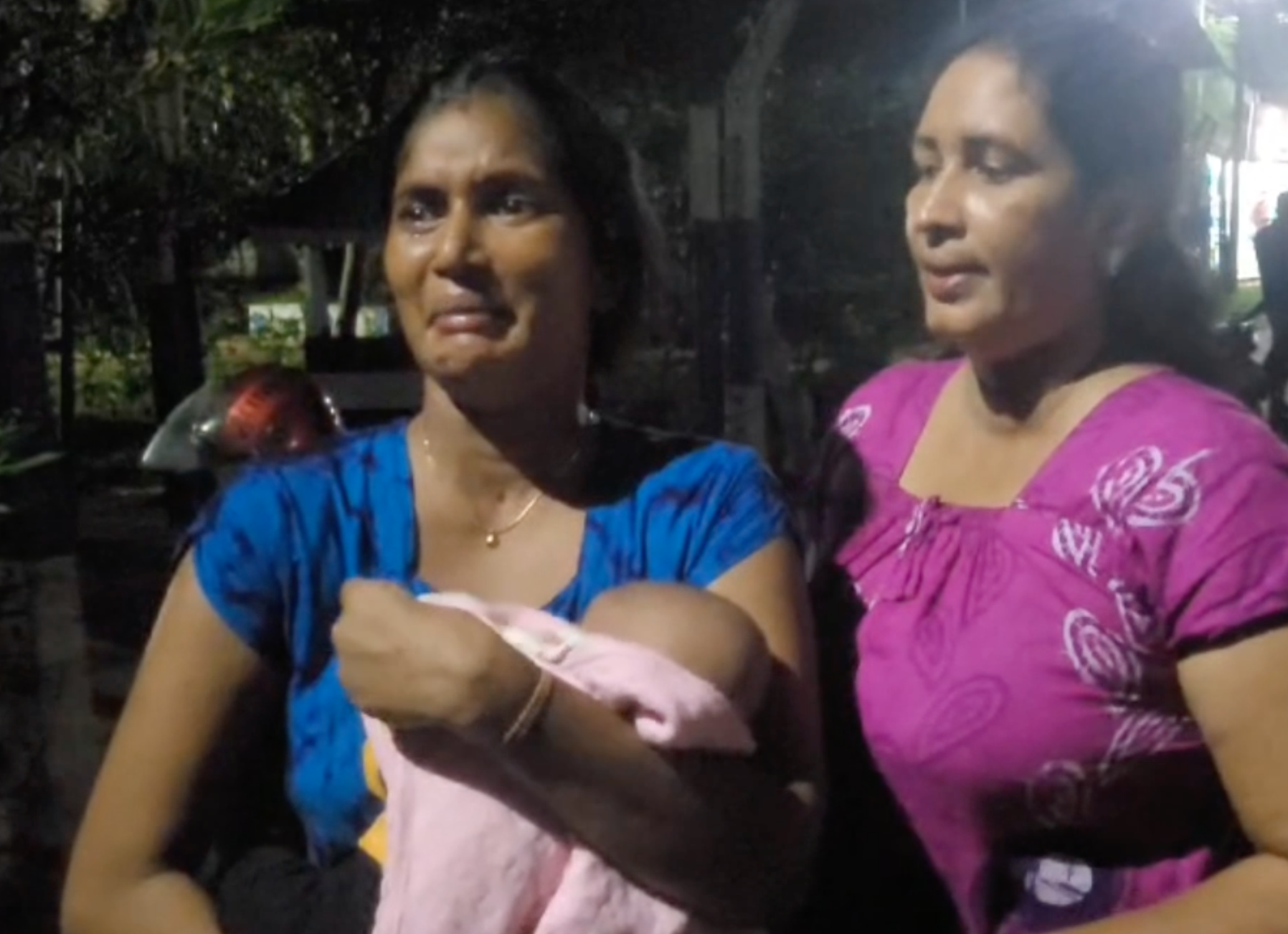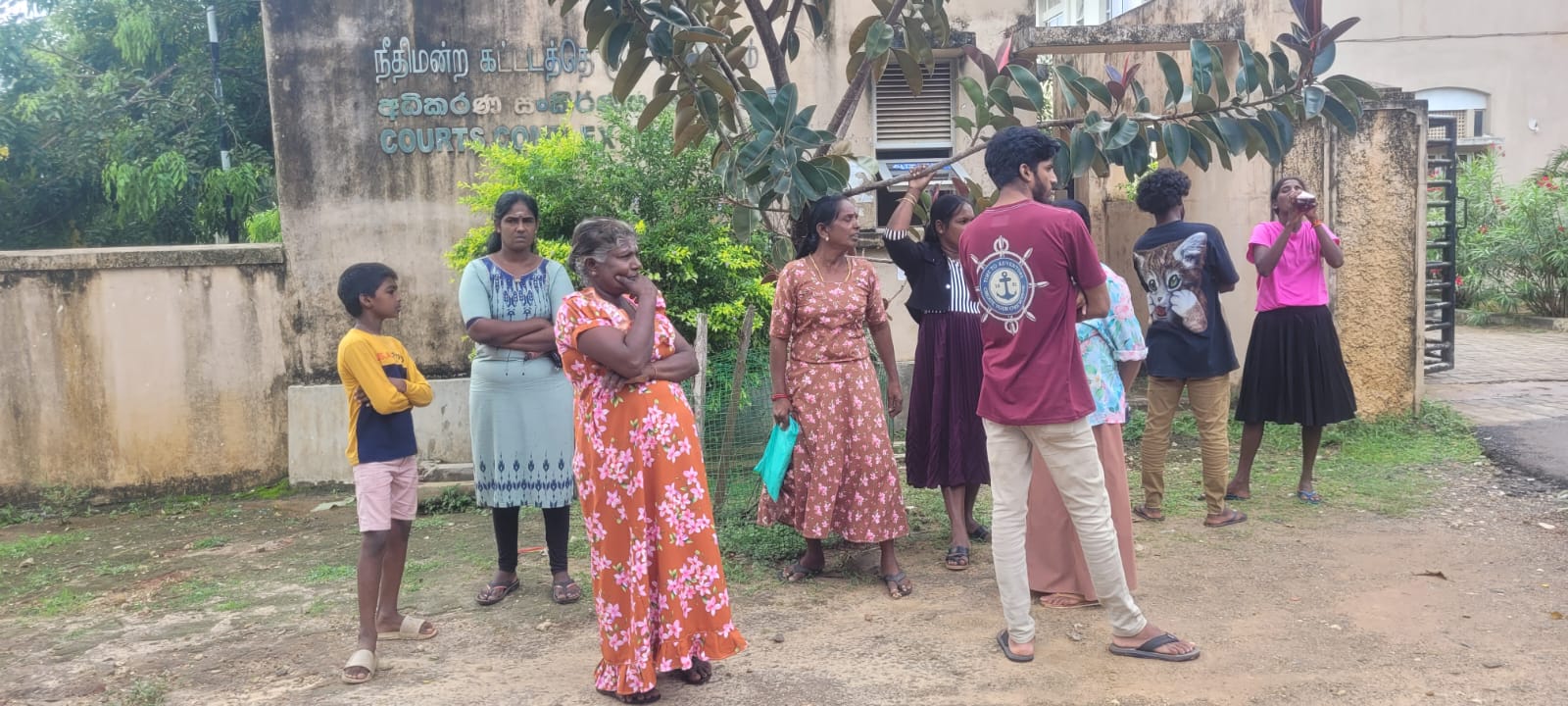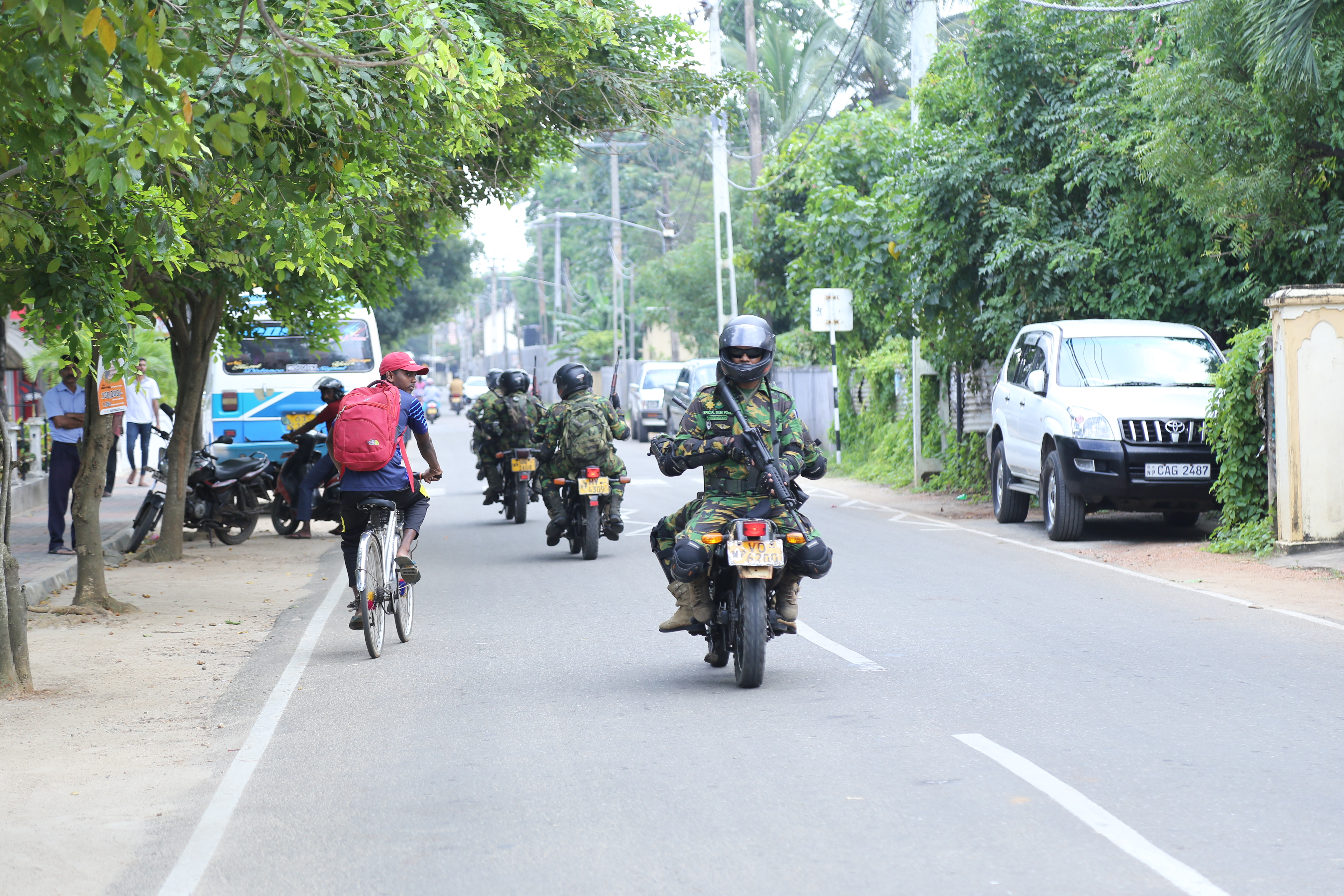
Sri Lankan police officers in Jaffna assaulted several Tamil civilians in Chunnakam last night, including a woman and her 2-month-old baby, in an incident that has sparked outrage and demands for justice, amidst ongoing police brutality.

Sri Lankan police officers in Jaffna assaulted several Tamil civilians in Chunnakam last night, including a woman and her 2-month-old baby, in an incident that has sparked outrage and demands for justice, amidst ongoing police brutality.
The incident began after a Tamil family were driving in Jaffna on Saturday evening when two motorcycles crashed into their vehicle. The incident sparked an assault by the security forces and protests outside at a newly built occupation police station, with video footage and testimony from the victims capturing the flaming tensions.
“As we were coming along the road, two motorcycles overtook us and collided, causing them to fall,” said a Tamil woman as she held her baby outside the police station in Chunnakam last night. She was travelling with her sister, husband, and child at the time.
“We stopped our vehicle as there was no fault on our part... The people who fell were drunk, and passersby said not to worry as he was under the influence of alcohol.”
As they got out of the vehicle to inspect the damage, more men started arriving at the scene. “Suddenly, officers dressed in civil clothes came and asked my husband for his licence,” she continued. “He did not provide it because only traffic officers are entitled to request it.”
At that point, the men, who were not uniformed and had not identified themselves, began to assault the Tamil family. The woman says both she and her husband were beaten at this point. She managed to phone her brother and inform him what was happening, but as he arrived, he too was assaulted.
“The police hit him and my sister,” she said. “My child fell on the road,” she continued, on the verge of tears. “They picked my child up and threw her into the bush.”
“As my husband tried to get in the van with our child to go to the hospital, they dropped the child and hit him with their hands. A police officer in a blue t-shirt stood in front of our vehicle with a metal pole, threatening to break it if we moved. They struck my brother repeatedly with the pole as he tried to take the child to the hospital.”
“If we hadn’t picked up our child, they would have stamped on her and killed her.”
An outraged crowd gathers
In the hours after the assault, an angry crowd had gathered outside of the police station in Chunnakam. The plainclothes officers in question, in addition to beating both the woman’s husband and brother, had arrested them and taken them into custody.
Locals, including relatives and Tamil National People’s Front (TNPF) former parliamentarian Selvarajah Kajendran, were demanding to know why the men had been arrested and why they had not been given immediate medical treatment.
“In my 43 years I have never seen such cruelty,” said the woman’s sister, who was also beaten herself. “I thought they were thugs.”
“They hit a 2-month-old child. They hit me on both sides of my head… This is anarchy, we are scared, we can’t live.”
“My brother’s body is covered in bruises,” said the woman, stating that he was beaten further after the men were taken inside the police station.
“Go and look inside,” they gestured, pointing to the station as they stood outside.
File photograph: Sri Lanka's Special Task Force on patrol in Jaffna earlier this year.
The newly opened police station in Chunnakam is another imposing structure, one of several military and police outposts occupying the Tamil North-East. It has been more than 15 years since the Mullivaikkal genocide that ended the armed conflict, and almost 30 years since Jaffna was under complete Sri Lankan military occupation.
Yet, Tamil Eelam, the name of the Tamil North-East, remains one of the most militarised places in the world. Sri Lanka’s security forces is bigger in total number than that of several states, including Britain, with a military-to-civilian ratio that is one of the highest across the globe. The presence of the security forces is most acutely felt in the Tamil homeland, where the majority of Sri Lanka’s troops are stationed.
That intense militarisation has brought with it an ongoing climate of impunity for continued human rights abuses. As described by the UN High Commissioner for Human Rights earlier this year, torture, rape and other abuses remain rampant. Amidst the ongoing violence and complete lack of accountability for it, Tamils have felt powerless, with many even looking to flee the island.
'We are not going anywhere'
“I have seen you taken him inside that room,” pointed another Tamil woman, as several locals confronted police officers at the barbed wire gate of the police station. “We are not going anywhere.”
In heated exchanges in Tamil and Sinhalese, the language of Sri Lanka’s police officers even in Jaffna, locals demanded the men be taken to hospital and treated for their injuries.
One officer was caught on camera repeatedly going back and forth from the station, brashly confronting the crowd of men and women that had gathered. At one point he claimed that the police were doing their duty. At another point he claims the crowd were “uneducated” and “drunk”, telling them all to go home.
“Is beating civilians was part of your duty?” shouted one man. “Sinhalese are killing Tamils,” exclaimed another.
“Who did we hit?” said the officer, who spoke in accented Tamil. “Go and prove it in court.” Beside him stood several Sri Lankan officers, some with their phones out taking close-up videos of the crowd barely a metre away. Out of the dozen or so officers there, only one was dressed in any official uniform.
The Sri Lankan police initially denied they had taken anyone into custody.
“We are scared they will harm my brother and husband,” said the assaulted Tamil woman. “This child could lose her father, and without them, we have no one.”
“The police say they don’t know who we are talking about. How can you hand over someone you don’t know? How can I live tomorrow if they kill my brother and my husband?”
Given Sri Lanka’s long history of abductions and enforced disappearances, her fears are well-founded. Over several decades, tens of thousands of Tamils have been forcibly disappeared, many last seen in Sri Lankan military or police custody and then never heard from again. To this day, Tamil mothers continue to protest along the streets of Tamil Eelam demanding to know the whereabouts of their loved ones.
'We want justice'
With dozens of Sri Lankan officers now outside the police station gate, tensions rose, and tempers continued to flare.
“Tomorrow, you will be on election duty!” shouted one Tamil man at a group of Sinhalese police officers who were being shepherded back inside the station.
Suddenly one of them lurched to pick up a rock. The man who he was seemingly aiming it at, sat on the floor, daring the officer to hit him.
“You are the one who threw the rock at the police,” another, seemingly more senior officer shouted at the Tamil man, unaware that the whole incident was being filmed.
As more officers began marching out of the station, the Tamil man’s friends began pulling him back and away from the danger ahead, as he continued to shout at the officers. “Go run away,” the officer kept repeating, as the Tamil crowd hastily retreated.
“We want justice,” pleaded the Tamil woman to reporters outside of the police station. “My brother’s body is covered in bruises. The public won’t come forward as witnesses, but there is CCTV footage.”
“We want justice.”
Custody for another week

Relatives of the Tamil men wait outside the court on Sunday.
On Sunday morning, the two Tamil men were marched before a Sri Lankan court.
“During the proceedings, we highlighted the unwarranted actions by the police force - those meant to uphold the law and protect the public - who instead acted beyond their authority,” said N. Kandeepan, a lawyer for the men.
“Despite a political change to Anura Kumara Dissanayake, the nature of these incidents has not changed. The police force’s brutality and lawlessness persist.”
“As you are aware, a member of the police force in Chunakkam, Officer Sigera, was previously involved in an incident where he attacked and killed a person, placing the body in a well, which led to a case against him,” said Kandeepan highlighting the torturous history of Sri Lankan police brutality.
“Now, similarly, the arrested individuals have been taken to the police station, where they were brutally assaulted.”
The two men now remain in Sri Lankan custody for at least another week. One of them is currently receiving treatment at Jaffna Teaching Hospital, whilst the police officer accused of assaulting the men has himself been admitted to Tellipalai Hospital.
“As we have filed this case against the police, it has now been handed over to the Deputy Inspector General of Police, who has instructed that the investigation continue,” said Kandeepan. “We remain committed to clearing the names of the affected individuals.”
Given the climate of impunity for abuses on the island, however, it remains unclear whether justice for this case or for those before it, will ever be served.

